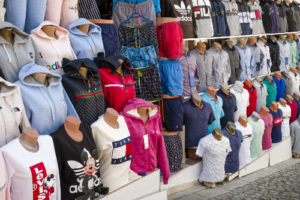Legally Reviewed By:
Brian P. Gabriel, Esquire
 Have you ever tried to purchase something with cash when, from the depths of the cash drawer, the cashier uncovers a counterfeit detector pen? Suddenly, you begin to panic as they swipe the pen across your bill. “Did I accept a fake bill?” you wonder, as the cashier holds the bill up to the fluorescent light. As the cashier takes the remainder of the 21st century to examine President Jackson, you start to wonder if you could be spending the night behind bars for trying to buy milk with what could be a fake twenty.
Have you ever tried to purchase something with cash when, from the depths of the cash drawer, the cashier uncovers a counterfeit detector pen? Suddenly, you begin to panic as they swipe the pen across your bill. “Did I accept a fake bill?” you wonder, as the cashier holds the bill up to the fluorescent light. As the cashier takes the remainder of the 21st century to examine President Jackson, you start to wonder if you could be spending the night behind bars for trying to buy milk with what could be a fake twenty.
Although many people think that this situation is the only time they can come close to the world of counterfeiting, they couldn’t be more wrong. Counterfeit products from designer purses, to electronics, makeup, and everything in-between are purchased every single day in Florida, often by unassuming consumers.
What Does it Mean to Counterfeit Something?
Counterfeiting is the intentional, fraudulent reproduction of money, documents, designer products, and other valuable items. Illegitimately reproducing products or legal tender with the intent to deceive or seek profit from the trademark owner is illegal under state and federal law.
Some of the most commonly counterfeited items include:
- Cash
- Watches
- Clothing
- Jewelry
- Drugs
- Movies
- Passports
- Credit cards
- Bonds
- Licenses
Knowingly purchasing or possessing a counterfeit product is also prohibited under Florida State law.
In order to combat counterfeiting, many countries use trademark symbols to protect companies against the theft of their intellectual properties. These legally binding symbols provide customers with a way to identify merchandise made by a particular brand as they differentiate a brand’s products from companies attempting to dupe their designs. Any individual or company who uses a trademark without first securing permission from the trademark’s owner could face state or federal charges for counterfeiting.
What are the Penalties for Counterfeiting in Florida?
The State of Florida categorizes counterfeiting offenses in two distinctions. They are:
- Forging or counterfeiting a good or service protected by a trademark or other intellectual property designation
- Selling goods or services with a phony trademark or other intellectual property designation
The severity of punishment for counterfeiting in Florida depends on the number of items counterfeited. Penalties are as follows:
- If the number of items counterfeited or sold is less than 100, the defendant could be charged with a first-degree misdemeanor, punishable by up to one year in jail.
- If the number of items counterfeited or sold is between 100 and 1,000, the defendant could be charged with a third-degree felony, punishable by up to five years in prison.
- If the number of items counterfeited or sold is over 1,000, the defendant could be charged with a second-degree felony, punishable by up to fifteen years in prison.
Depending on the severity of the offense, either the State of Florida or the federal government could handle the prosecution. Regardless of which entity prosecutes a counterfeiting charge, defendants should enlist the help of an experienced criminal defense lawyer.
Don’t Face Severe Penalties for Counterfeiting in Florida Alone
If you or someone you care about is under investigation or has been charged with counterfeiting in Florida, Criminal Defense Attorney Brian Gabriel will work to protect you from the harsh penalties that often come with these types of charges. Mr. Gabriel has defended Floridians accused of crimes for over 30 years and will handle your case using all the knowledge and skill developed over the span of his triple-decade career.
To begin discussing your counterfeiting case with Mr. Gabriel, call The Law Office of Gabriel & Gabriel today at (561) 622-5575 or submit a contact form.



